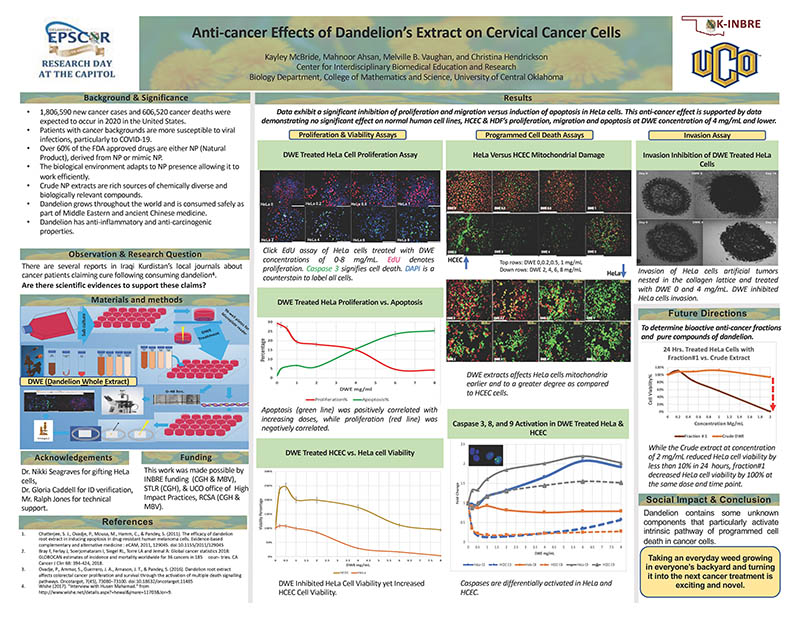
Hover to pan and click to magnify. Click again to pan at full screen.
Kayley McBride, M. Ahsan, M. Vaughan and C. Hendrickson, Dept. of Biology, University of Central Oklahoma, Edmond, OK. Faculty Advisor, Dr. Christina Hendrickson, University of Central Oklahoma, Edmond, OK.
Kayley McBride, M. Ahsan, M. Vaughan and C. Hendrickson, Dept. of Biology, University of Central Oklahoma, Edmond, OK. Faculty Advisor, Dr. Christina Hendrickson, University of Central Oklahoma, Edmond, OK.
ABSTRACT
According to the American Cancer Society Journal, 1,806,590 new cancer cases and 606,520 cancer deaths are expected to occur in 2020 in the United States. Despite the development of many forms of cancer therapy, there continues to be a high rate of death among patients. Existing cancer therapies can be very expensive, placing immense economic distress on afflicted families who are coping with this disease. Certain plant-derived products have pharmaceutical uses due to their anti-cancer effects. Dandelion (Taraxacum officinale) could be one of them. Dandelion is widely accessible, it grows throughout the world and has long been consumed safely as part of Middle Eastern and Ancient Chinese Medicine due to its anti-inflammatory and anti-carcinogenic properties. The mechanism of its effect on cancer cells is still unclear. This study investigated the anti-cancer effects of Dandelion on cervical cancer cells known as HeLa cells. It was hypothesized that the anti-cancer activity of dandelion extract acts by disrupting key cellular processes in tumor cells, which could result in growth inhibition, cell death and an overall decrease in their invasiveness.
Dandelion Whole Extract (DWE) was prepared, filtered, freeze-dried and resuspended in cell-growth media. HeLa cells and normal human cervical cells (HCEC) were maintained under standard in vitro cell culture conditions, then treated with DWE concentrations between 8 to 0 mg/ml for 96 hours. For a more realistic 3-dimensional approach, cells were cultured into collagen lattices to form artificial tumors and treated with similar varying concentrations of DWE. Our results showed that DWE inhibited proliferation and invasion while promoting programmed cell death in HeLa cells, but did not have such effects on HCEC cells.
This study supports the possible use of dandelion as a natural source of anti-cancer compounds against cervical cancer. Screening compounds derived from herbal plants, like dandelion, is an exciting approach for discovering new anti-cancer drugs. This study could potentially improve cancer treatment by unveiling cellular and molecular mechanisms behind anti-proliferative and anti-invasion effects of dandelion that are getting popularized as a cancer treatment.

DISQUS COMMENTS WILL BE SHOWN ONLY WHEN YOUR SITE IS ONLINE